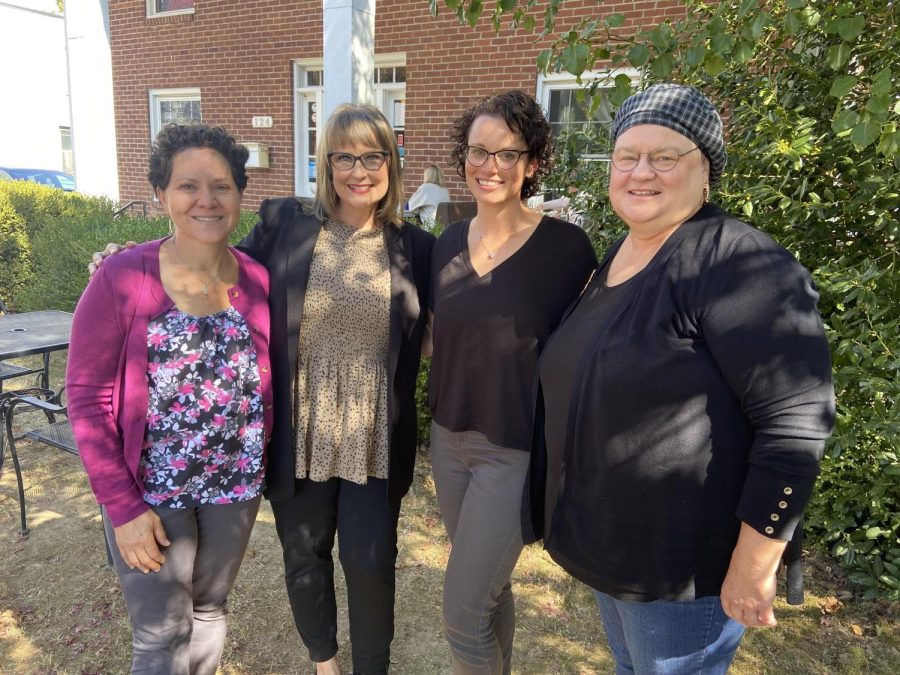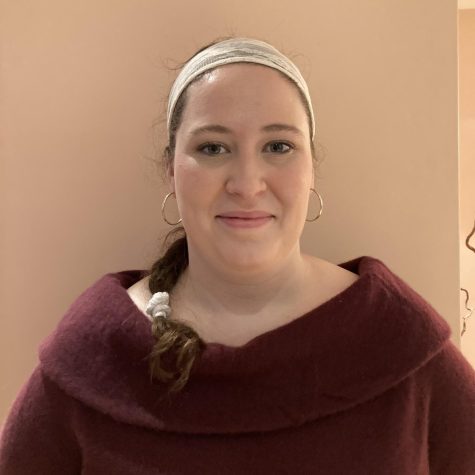Breast Cancer support group forms on campus
Members of the Pink Ribbon Racer photographed. From the left: Lori Roe, Carrie McGinnis Lisa Schmidt and Marcie Hinton. (Photo courtesy of Carrie McGinnis)
October 13, 2022
Pink Ribbon Racers began as a support group among friends and is now a campus organization supporting those who have been impacted by breast cancer.
Carrie McGinnis, director of Alumni Relations, is one of the founding members of the group. McGinnis said she was made aware of the need for the group after two breast cancer diagnoses of her own.
“I had people, who were also newly diagnosed, come to me and say things like, ‘I’ve been diagnosed with breast cancer,’” McGinnis said. “‘Do you have any advice?’”
The support group meets on the second Tuesday of every month for lunch. McGinnis said she hopes newly diagnosed people will see a group of survivors on campus who have been through diagnoses and treatments and will know they are not alone.
McGinnis said the group is also important because it allows individuals to share information they may not have gotten from medical professionals—experiences and information only cancer survivors would know.
“We need to be able to just talk to each other so that we can inform each other about unique experiences that may end up happening to you at some point,” McGinnis said.
McGinnis was diagnosed with breast cancer in May 2018. At that time, it was caught early through a regular screening, and she went through a lumpectomy and radiation. McGinnis’ treatments and surgery were initially successful and she had two months free from treatment. But in December 2021, the cancer returned.
Initially, McGinnis went through a type of treatment in which radiation therapy is given directly to the tumor area. Instead of going once a day for six weeks as many patients do, McGinnis went twice a day for a week.
The second treatment included a bilateral mastectomy and reconstruction. Because of a family history of breast cancer and the fact she had gotten it twice by the age of 46, McGinnis said she and the doctors decided a double mastectomy was the best option.
McGinnis had the mastectomy surgery in 2021 and just finished her reconstruction surgeries a few months ago.
Both times, regular, precautionary exams helped catch the cancer early.
Although treatment and diagnosis is different for everyone, McGinnis said the camaraderie among members of Pink Ribbon Racers is super helpful.
Lisa Schmidt, the coordinator of Dual Credit and Special Population for Racer Academy, also belongs to the support group. She said she started meeting informally with other women who had breast cancer on campus, and from there, it grew into more.
Schmidt was officially diagnosed in January 2021. Before that, she had a benign tumor in her 20s. A surgeon recommended she remove the tumor and come back every few years for follow ups.
When she went for a mammogram in 2019, the scan looked suspicious, so the medical staff told her to follow up with a surgeon. The surgeon told her it was not a reason for concern.
Later in 2021, she went for another mammogram, and they told her again it looked highly suspicious. After a biopsy, she was diagnosed with breast cancer.
“[The surgeon] said, ‘You have cancer,’” Schmidt said. “He was surprised because he kept saying, ‘You’re so young. You’re so young.’’
After the diagnosis, she decided to get a lumpectomy because the doctors warned her there was a higher chance the cancer would come back because she was young at the time. However, the cancer spread to her lymph nodes, so she needed chemotherapy treatments and surgery.
Schmidt needed four chemotherapy treatments, and after each round of treatment, she felt like she had a bad case of the flu. She started losing her hair after the first treatment, so she shaved it all off.
Finishing her radiation treatment a year ago, Schmidt says she will still have to continue various treatments for the next several years. She said the doctors prescribed a Lupron shot for the next few years and hormone blockers for the next 5-10 years.
“I will say cancer just steals little bits and pieces away from you constantly, and on the surface, the little things don’t seem that big, but once you just keep stealing, stealing, stealing—it’s like I just want to scream,” Schmidt said. “You almost have to mourn your body. You have to mourn your previous self because your body will never be the same again after cancer.”
Both Schmidt and McGinnis control what they can about their health, such as eating healthier foods, exercising, maintaining a healthy sleep schedule and going for regular checkups.
Schmidt said she finds the support group valuable because of the shared experiences among the members.
“I think whenever you go into that room, you can just breathe,” Schmidt said. “Everybody there knows exactly what you went through.”
Dena Weinberger, an associate professor of biology, said she has only attended one meeting with the group so far.
Weinberger said the group is larger than she thought it would be on a campus this size. It also skewed younger than she expected.
Weinberger was diagnosed young as well at 34 years old. She found a lump and went to the hospital for testing, and all the noninvasive tests showed the lump was benign. She had two choices: a check-up every six months or removal of the lump.
She chose removal, and afterwards, the medical staff did a routine pathology and found the lump was not benign after all. Weinberger said she then had to go to the oncology ward and ended up being treated with chemotherapy.
Less than a year after Weinberger finished those treatments, she was diagnosed with another type of breast cancer.
Weinberger said the first cancer treatment she went through is only effective on certain types of cancer. This second diagnosis was a different type of cancer that the chemotherapy treatment was not effective against.
“One of the things that I think is hard for people to get when they’re not a part of it is that every cancer is different…you’re never going to be able to cure it in the way that we think of curing most diseases because the collection of mutations that led to my disease was different than the person next to me who has the exact same diagnosis,” Weinberger said.
Weinberger had a surgery recently and said she will have at least one more surgery before her treatment is complete.
“I will say that sometimes the uncertainty can be harder to deal with because you don’t know what you’re going to do,” Weinberger said. “You don’t know when it’s going to happen. You don’t know what you’re going to need.”
Although people wanted to help her, Weinberger said she often did not know what to ask for. In the support group, though, she doesn’t have this dilemma.
“It’s sort of a place to air grievances and just let it out to people who understand,” Weinberger said.
As a private person, Weinberger hesitated to join a support group“I’m glad that [Pink Ribbon Racers] does not match my fears of a pity party,” Weinberger said. “It’s much more of, ‘This is what happened to me. This is what I’ve learned. Let me complain about this for a while. I just need to get it out to someone who knows.’”
McGinnis said the group is open to the campus community. Anyone who is interested in joining the group can email her at cmcginnis2@murraystate.edu.



























































































